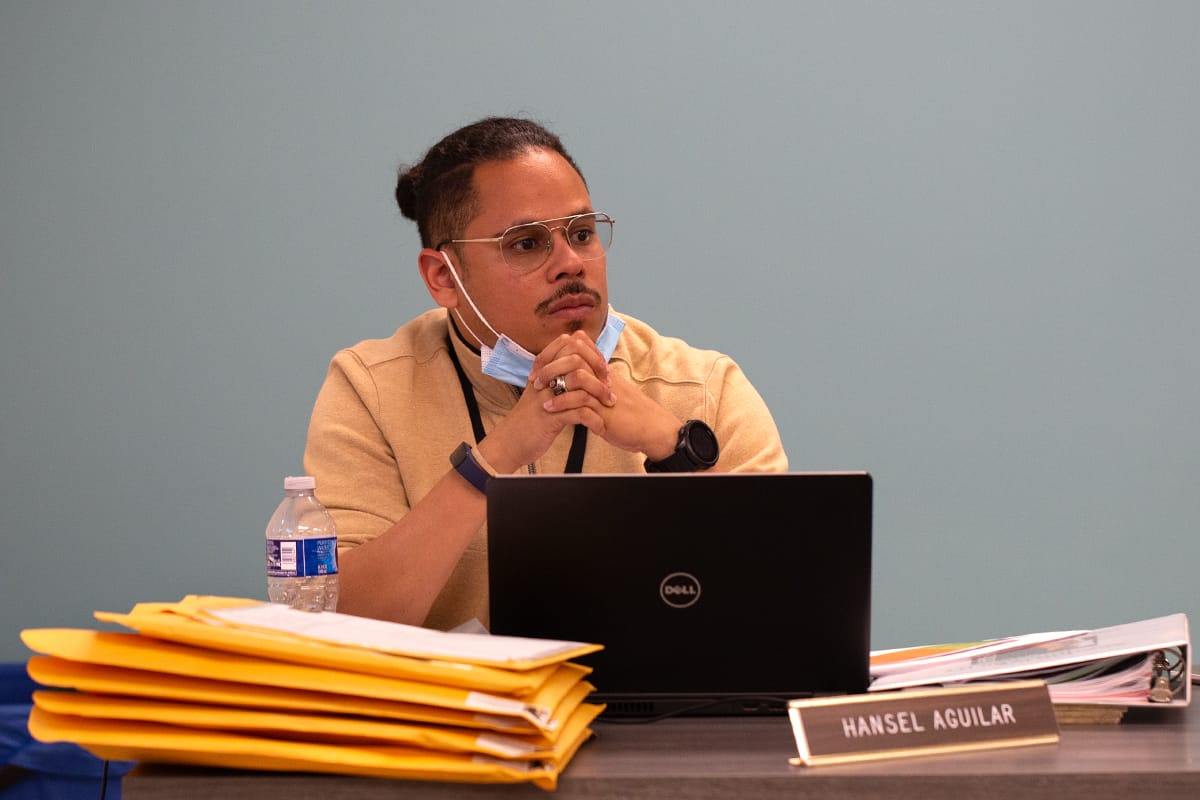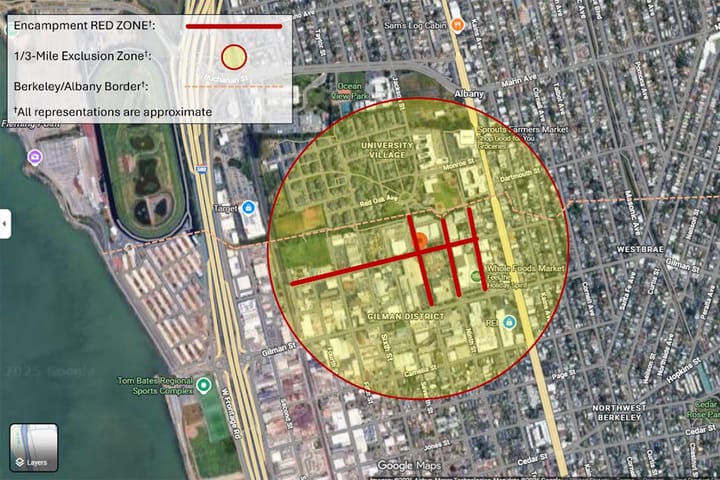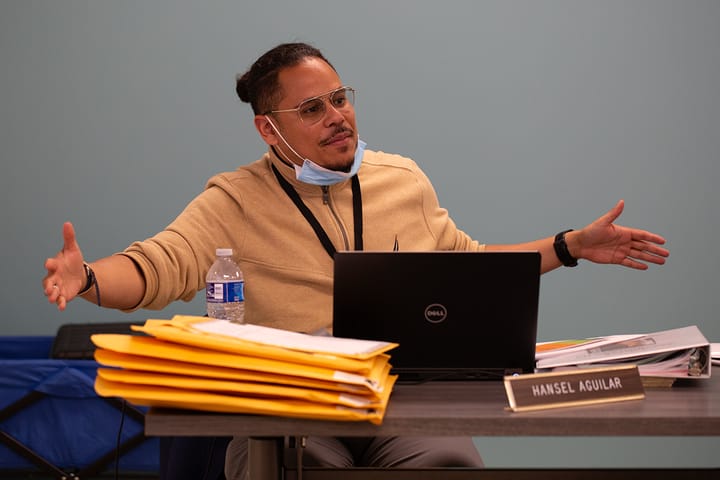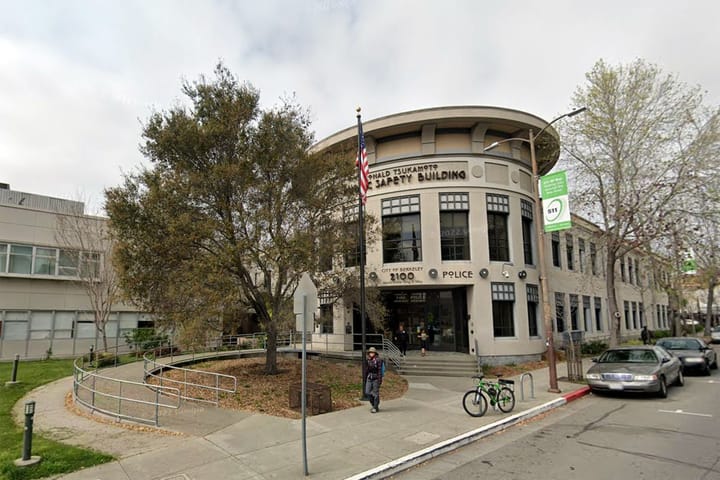Berkeley officials offer stern rebuke to police oversight chief
"It just feels like … you're in constant opposition with what we're recommending to you," Mayor Adena Ishii told Hansel Aguilar.

It was a tough night for Berkeley's police oversight director.
Hansel Aguilar, who runs Berkeley's civilian police oversight program as the director of police accountability, came before the Berkeley City Council on Tuesday with two requests. Both failed.
In one, Aguilar asked council to push for a change in state law so he could seek opinions from the attorney general's office when he needed more insight than he was getting from the Berkeley city attorney's office.
In the other, he asked officials to restrict the city from commenting on certain policing matters if Aguilar's office had its own investigations underway.
Both items appeared to challenge the patience of officials on the dais, although they took pains — some more than others — to share their criticism constructively.
When it was her turn to speak, Mayor Adena Ishii minced no words.
"I'm really disappointed that this came the way that it did," she told Aguilar. "It just feels like … you're in constant opposition with what we're recommending to you."
"I feel like there is a pattern here, right?" Councilman Terry Taplin said. "Some people don't like the findings of the investigation. Some people don't like the appointment of the police chief. And then we have to keep re-litigating each over and over again."
"I don't think that's the best way to model this kind of configuration that we have here," Taplin said.
"Finish the task on your plate," Councilman Ben Bartlett told Aguilar. "It appears as if we're in danger of … focusing on too many things instead of the task at hand. Which is really: Accomplish the task before you."
Tuesday night's meeting appeared to be the culmination of the Police Accountability Board's ongoing struggles to find its focus.
Berkeley voters approved the creation of the board in 2020 as an update to the longstanding Police Review Commission. Years later, it has yet to adopt permanent regulations due to a variety of ongoing challenges. (That work remains underway.)
On Tuesday night, one after another, Berkeley's elected leaders offered Aguilar advice and guidance on how to get the oversight body on track.
And they made it clear that neither of the proposals Aguilar had brought forward inspired much confidence.
Councilman Mark Humbert told Aguilar he may have had more success had he taken the advice of a council subcommittee to clarify his items at the Public Safety Policy Committee before attempting to force a council vote.
Humbert said the items as presented left a lot to be desired, particularly due to the inclusion of a particular companion report Aguilar had previously authored.
"Are we advocating for legislation? Are we being asked to sign off on some sort of admission or approval regarding this companion report? Are we endorsing the companion report's recommendations?" Humbert asked. "This altogether creates a sense of ambiguity about what this item is trying to achieve."
Humbert said it seemed to be "a repeat of the same confusion faced previously when the [director of police accountability] attached this report to another item, but ultimately failed to clarify … whether it was being presented purely for information or for some sort of action."
City officials asked pointed questions about how much time and effort Aguilar had spent to get other stakeholders on board — whether that meant city staff or state legislators such as Sen. Jesse Arreguín, Berkeley's former mayor who now chairs the state senate's Standing Committee on Public Safety.
"What makes our relationship with the state so useful is being able to leverage the ability to reach out and work on things together so that we are moving in tandem," Taplin said.
In some cases, Aguilar said he hadn't done the outreach at all. In others, he said there had been conversations but that he didn't have all the answers.
At one point, Councilman Igor Tregub asked if the Police Accountability Board (PAB) itself had weighed in on Aguilar's proposal to revise the city's communications policy.
"Not weighed in, but it was presented to them. So they were given this resolution and they were given the opportunity to send any materials or to make it a vote," he said. "They took no action."
Mayor Ishii said she found it "really interesting … that no one from PAB came to speak in support of this tonight," adding: "I think that that's worth mentioning."
It wasn't only PAB members who declined to speak on the items Tuesday night. Hardly anyone from the public commented either, either in person or on Zoom.
Brent Blackaby, who served on the Police Accountability Board before being elected to the City Council last year, spoke at length Tuesday night — to challenge some of the suggestions in Aguilar's items, but also to suggest a path forward.
He said he hoped to see the board look closely at the police budget, as it had in the past, as well as the department's new early intervention system (to help identify "problem officers before they become problems"), which is supposed to come online before the year is out.
He said he hoped PAB would look closely at surveillance technology, such as cameras and drones, to help the city find reliable, responsible vendors and craft robust use policies.
"There are so many things … where I think the PAB's role is really critical and really vital," Blackaby said. "I hope we can move past these and then get back to the substantive work where the PAB could really add a ton of value. And I hope they will."
Ultimately, council voted, in response to motions by Mayor Adena Ishii, to take no action on the item related to the attorney general's office and to have the city attorney's office write up a memo related to its existing communications.
"I do think it is important that that communication is clear: That we are clear about what is allowed and not allowed to say," she said.
After the votes, before council adjourned, Aguilar asked for a moment to respond.
"I've been here three years," he said. "I've been consistently asking for performance evaluations. So, to be publicly given a performance evaluation like this, your expression of your disappointment with me, I don't think it's appropriate. And I think we should have a closed session conversation if there's other concerns about my performance."
"But I do appreciate this conversation that we're having here and what the expectation of council is," he said. " I just want to note that I think it's important, for our office to be able to perform to the expectations of council, to have clear direction, metrics and conversation about where we are in performance. So I appreciate the feedback."
Ishii responded that the city is working to secure consultants who can undertake evaluations of all its charter officers.
"That will be coming," she said.
Councilman Bartlett offered Aguilar words of encouragement to take with him as the night wound down.
"Trust me: I've been in office for, what, nine years now. I still go through the process and I get torn apart and reassemble," he said. "If I can take it, you can take it, too. So that's my suggestion to you is: You work on this and figure out what exactly you're trying to move forward and how it serves the interest of the city."




